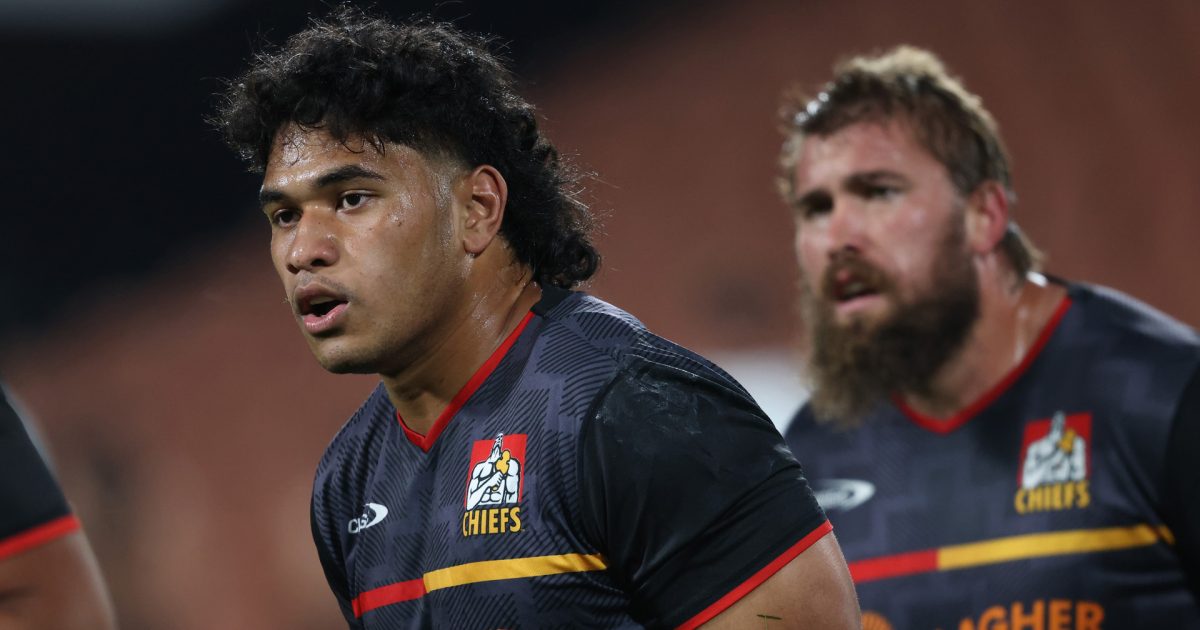The Chiefs breakout No.8 who was named after Braveheart

Wallace Sititi would have been satisfied with one game for the Chiefs in 2024. He’s played seven, including five stars in a row.
Curiously Sititi captained the Blues U20 side and was voted the franchise’s Development Player of the Year in 2022.
He sensed his real value wasn’t appreciated in Auckland when he was loaned to North Harbour, so he migrated south to Hamilton, persuaded in large part by New Zealand U20 and Chiefs manager Martyn Vercoe.
“My first start at home against Moana Pasifika is a highlight. It was one of those games where things go your way and you feel the flow,” Sititi told RugbyPass.
The Chiefs won that game on 6 April 68-12, their biggest margin of victory in any match passing the 61-10 win over the Sunwolves in 2018. Sititi had debuted a fortnight earlier in a 19-25 loss to the Reds in Brisbane but impressed in 20 minutes off the bench in a 28-21 win against Highlanders a week later. Sititi carried for 26 metres and made 13 tackles.
Perhaps his best performance was in a 38-22 win against the Waratahs in Sydney on 26 April. The 187cm, 112 kg loose forward matched the hosts renowned physicality and scored a try.
“The Waratahs are way better than the ladder says. They’ve been unlucky with their results and even when they do lose, they’re right there. They’ve got some big bodies in their locking department and loose forwards,” Sititi said.
“The Hurricanes are the toughest side I’ve played. Their physicality was on another level. We lost that game. There was a big crowd, very intense. If I stay locked into my role then those external factors won’t be as mentally challenging.”
Chiefs coach Clayton McMillan, himself an abrasive loose forward who played 113 games for Bay of Plenty, said of his No.8:
“He’s exploded on the scene. He had to bide his time in our environment for five or six months and then got his opportunity and nailed it. He hasn’t missed out on the match day 23 since then.
“He’s a talented young man, got a mature head on his shoulders, comes from good stock and he’s another young man who’s going to get better. We’ve got to make sure that we look after him and make sure he stays grounded. You have to love the explosiveness in his game.”
Wallace is the son of former Samoan captain Semo Sititi (59 Tests, 17 tries, 33 wins) who appeared in the Rugby World Cup three times with his try against 2003 champions England one of the greatest moments in the history of the tournament. Keith Quinn reported.
“Samoa made electrifying attacks that thrilled their supporters. The most memorable was when popular captain Semo Sititi swung on to the end of some high-speed interplay in an 80-metre rush. No fewer than 11 Samoan players handled the ball and Sititi dived over for a try.”
Semo won an NPC title with Wellington in 2000 and played professionally in the UK and Japan for more than a decade. Semo is from a generation of players who greatly enhanced the esteem in which Samoan players are held.
“Dad is a benchmark on and off the field but I’m not trying to be him. He’s encouraged me to create my own strengths,” Sititi said.
“I was born in Samoa. Dad was based in Scotland but when Mum’s dad got sick, she flew back to Samoa with my older sister.
“Dad wasn’t present at my birth. My parents loved the movie Braveheart, with the warrior William Wallace, and they thought William was a bit too common, so they just made Wallace a first name.
“I spent the first five years of my life in Scotland and then we lived in Osaka for seven years. It’s very different from New Zealand with the crowds and culture.
“I didn’t play rugby until I went to De La Salle College. I was captain of the First XV in 2020. We weren’t the strongest team, but we worked hard and appreciated what we had.
“Captaincy was challenging. Building strong connections off the field and delivering messages in a relatable way were the things I learnt to do better.”
The Chiefs are third in Super Rugby Pacific with an 8-3 record. They’ve won three in a row and should conquer the struggling Rebels in Melbourne on Friday night. The Chiefs finish the regular season with the Hurricanes at home and the Blues away. Win those matches and they could position themselves to host the final for a second successive year.


































































Talent to burn and a huge engine..hope he gets a shot at higher honours
Thank goodness he wasn't born in Scotland, he'd have been a great candidate for the Scottish Barbarians. I wouldn't put it past them to push for a “where the player was conceived” rule 😂